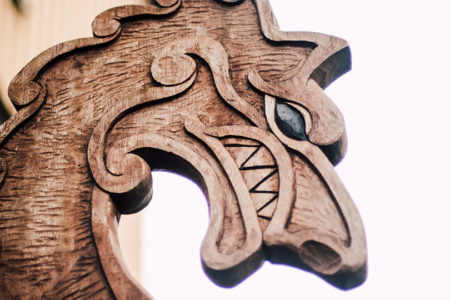The Church in Crises and Commitment Revelation 3:1–13
It has been said that many churches begin with a man, reach out with a mission, become a movement, and eventually end up a monument. Often this is true, but not for every church. The church at Sardis was spiritually dead and did end up as a monument, but the church at Philadelphia was spiritually alive and ministered for centuries. Both of these churches have an important message for us today.
Sardis: The Spiritually Dead Church
The city of Sardis was 30 miles southeast of Thyatira, the capital of the Lydian kingdom. It stood about 1,500 feet above the Hermus valley, giving the city a false sense of security over her enemies. Sardis was defeated, once by King Cyrus of Persia (549 BC) and again by Antiochus III of Syria (218 BC). One thousand feet above the plains stood an impressive acropolis that housed a temple dedicated to the goddess Artemis. The worshipers of Artemis were a nature cult, dating back to the fourth century BC, that believed in death and rebirth. The city was noted for its impressive necropolis, the hundreds of burial mounds dotting its landscape.
Sardis was situated on five major trade routes running through Lydia. This brought great wealth to the city, which was acquired through jewelry, wool, and the dying industry. But by the second century AD, Sardis lay in decay, near death, only a shadow of her former glory. Today Sardis is a small village called Sart. When and how the church there was started are unknown.
Christ revealed Himself to this church as the one who “hath the seven spirits of God” (v. 1), a reference to the sevenfold fullness and perfection of the Holy Spirit that rested upon Christ (1:4; 5:6; cf. Isa. 11:2–5). He also controls the “seven stars” (v. 1) or spiritual leaders of these churches. They are in the hand of the Lord and will be held accountable to Him for the church’s spiritual life and service. Spiritual life or deadness within the church is often governed by the spiritual life of its leadership.
The Lord gave no commendation to this church, only criticism: “I know thy works, that thou hast a name that thou livest, and art dead” (v. 1). Sardis had the look of life and a reputation for religious activity, but it lacked evidence of spiritual life. Many modern-day churches live on the spiritual reputation of days gone by but have been spiritually dead for years.
Christ counseled this church to seek spiritual healing. First, they were to “Be watchful” (v. 2), or wake up to their spiritual state. Renewal would come by recalling their original commitment and radically reversing their current conduct.
Second, they were to “strengthen the things which remain, that are ready to die” (v. 2). This could be done by removing false doctrine, carnal leadership, unbiblical practices, and meaningless activity. Spiritual strength is produced by getting back to the basics, spending time in God’s Word and in prayer.
Third, the Lord called them to “Remember, therefore, how thou hast received and heard, and hold fast, and repent” (v. 3). They were to embrace the fundamental doctrines of the faith and repent of their spiritual emptiness. Failure to comply would bring judgment from the Lord, who would come upon them “as a thief,” and they would not “know [the] hour” (v. 3) of His appearing. Often the Lord removes a spiritually dead church rather than let it continue to infect others with its decadence.
Fifth, the Lord made special mention of those who had not compromised their faith: “Thou hast a few names even in Sardis that have not defiled their garments” (v. 4). The pagan religion of Sardis forbade its followers to come before the gods in garments that were stained or soiled. Those who did so were removed from the public ledger as citizens of Sardis.1 Christians who soiled their garments were seen as mingling with the pagan life of the city and compromising with sin. Those not defiling their garments would “walk with [the Lord] in white; for they are worthy” (v. 4), for they had gone before their God in a state of cleanliness.
Three promises were made to the conqueror. First, “He that overcometh, the same shall be clothed in white raiment” (v. 5). White raiment is a symbol of purity and righteousness, the garment of salvation. It was symbolic of the faithful remnant gaining spiritual victory over the paganism of Sardis. At the “marriage of the Lamb” (Rev. 19:7–8), all believers will be arrayed in fine linen and will return to earth with the Lord clothed in those garments (19:14).
Second, the overcomer is recorded in the divine register: “I will not blot his name out of the book of life” (v. 5). In biblical times, the names of individuals were recorded in the city register, and after their death or departure from the city, they were erased or marked out of the book of the living.2 The possibility of losing salvation is not mentioned here. Rather, this is an affirmation that those who are born again possess eternal life, and no person or thing can ever separate Christians from eternal life.
Third, the Lord will declare the believer’s name before heaven: “I will confess his name before my Father, and before his angels” (v. 5). This promises believers the assurance of eternal citizenship. Christ is their advocate before God the Father (1 Jn. 2:1) and will acknowledge their names to the Father (cf. Mt. 10:32), possibly at the Bema judgment.
Once again Christ challenged the readers to hear and heed His message: “He that hath an ear, let him hear what the Spirit saith unto the churches” (v. 6). This warning was especially significant to a spiritually dead church like Sardis. And, if many of us were honest before God, we, or perhaps even our churches, need to heed it as well.
Philadelphia: The Spiritually Alive Church
The city of Philadelphia was located in the Hermus River valley about 28 miles southeast of Sardis. Founded by King Attalus of Pergamum (140 BC), the city transmitted the Greek language and culture to Lydia and Phygia. It was built on a volcanic mountain range (900 feet high), thus the city experienced many earthquakes. An earthquake in AD 17, destroyed Philadelphia, but it was rebuilt by Emperor Tiberias. The city prospered due to its location and rich fertile valley. Along with its large grape industry, Philadelphia was noted for textiles and leather goods. Its high position between the coastal plains and the interior of Asia Minor made Philadelphia a strong fortress city. Because of this height and the major highways running through the city, it became an Imperial Post of the Roman Empire called “the gateway to the East.” The worship of Dionysus was the major pagan cult. In the fifth century it was nicknamed “Little Athens” because of its many festivals and pagan cults.
When and how the church at Philadelphia was established are unknown, but it prospered for many centuries, long after the area had succumbed to Islamic control. The word Philadelphia means brotherly love and is emblematic of this church.
Christ presented Himself in three ways to Philadelphia. First, He is “holy” (v. 7). As God, Christ is holy, entirely set apart and separated from sin and sinners. Holiness is the foremost attribute of Christ because it pervades all the attributes of God and is consistent with who He is and what He does. Holiness points to Christ’s majestic purity or ethical majesty.3
Second, He is “true” (v. 7). Christ is the true God, distinct from all others. What he says is “the truth” (Jn. 14:6), and His Word of revelation is without error, reliable, and trustworthy. He is the source of all knowledge and truth in the universe.
Third, He is the one “that hath the key of David, he that openeth, and no man shutteth; and shutteth and no man openeth” (v. 7). The imagery of the “key of David” is mentioned in the context of Isaiah 22:20–22. Eliakim, who had replaced unfaithful Shebna as King Hezekiah’s steward, was given authority over the king’s house and his treasury. The “key” represents authority and power over the Davidic house and kingdom. No one could reverse what Eliakim opened or shut. In like manner, Christ who is holy, true, and of the Davidic line, possesses absolute authority to administer the spiritual and material affairs of God’s Kingdom. Earlier in Revelation the Lord is described as having “the keys of hades and of death” (1:18).
The Lord commended the church at Philadelphia for their good works. Although they had only “a little strength,” the Lord said that they “kept [His] word, and hast not denied [His] name” (v. 8). Humanly, the church was not very strong, but God had infused this faithful group with spiritual power enabling them to be true to His name in the midst of satanic opposition. Because of their faithfulness, the Lord “set before [them] an open door, and no man can shut it” (v. 8). This church had an open door for evangelizing the surrounding region because of its commitment and strategic location. God does not need naturally gifted vessels for His service (1 Cor. 1:26–29) but yielded people through whom He can minister (2 Cor. 4:7). Effective service does not depend upon the size of a church but upon its availability to be used.
Like the church in Smyrna, the Philadelphians were being persecuted by the “synagogue of Satan” (v. 9), but they overcame the intrusion of legalistic opposition and defeated Satan’s effort to corrupt the church. They were told that the day would come when their enemies would “worship before [their] feet” (v. 9), symbolic of a defeated foe. Also, their enemies would come to know of Christ’s great love for these believers (v. 9; cf. 1:5; Eph. 5:25).
The Lord gave this church a promise of protection: “Because thou hast kept the word of my patience, I also will keep thee from [out of] the hour of temptation, which shall come upon all the world, to try them that dwell upon the earth” (v. 10). Many teach that the church will go through a portion or all of the Tribulation mentioned in Revelation 6–19, but the language of this verse makes it clear that the church will not go into the tribulation. This hour of trial will be a time when God’s wrath will be poured out upon the world (Rev. 6–19). Several things verify this fact.
First, the preposition from (ek) means out of; that is out of the midst of, a clear indication that the church will not go through any portion of the Tribulation. If the writer meant to say that the church was going through tribulation, he could have used a different Greek preposition (dia). Second, this is not just any trial, but the hour of trial, a specific season of Tribulation that is coming. Third, Christ promised to “keep” (protect or preserve) the church, not in, but from this season of trial. Fourth, protection is granted to all believers, not just the Philadelphia church, because this time of Tribulation will come “upon all the world.” Fifth, the phrase “to try them that dwell upon the earth” refers, not to the church, but to unbelievers who will be settled into the world’s system during the Tribulation.
The Lord provided counsel to this church: “Behold, I come quickly [suddenly]; hold that fast which thou hast, that no man take thy crown” (v. 11). Those in the church were to remain faithful, rather than give in to their enemies, so that they would not lose their reward at the Bema judgment (1 Cor. 3:15; 2 Cor. 5:10).
Two promises are given to the conqueror. First, he is promised security: “Him … will I make a pillar in the temple of my God, and he shall go no more out” (v. 12). This statement was very meaningful to people who experienced continual earthquakes. A pillar in the temple of God symbolizes salvation, spiritual stability, and the eternal security of never being separated from the shelter of God’s presence. Second, the signature of God will be inscribed upon him: “I will write upon him the name of my God, and the name of the city of my God, the new Jerusalem … and … my new name” (v. 12). These names inscribed upon individuals signify total identification with God and ensure them an eternal place in His kingdom.
Is your ear open to what the Spirit said to this church (v. 13)? Are you keeping God’s Word, standing for His name, enduring tribulation, and walking through the open door of service?
ENDNOTE
- Alan F. Johnson, The Expositor’s Bible Commentary, Revelation ( Grand Rapids: Zondervan Publishing House, 1981), Vol. XII, p. 449.
- Ibid.
- Paul Enns, The Moody Handbook of Theology (Chicago: Moody Press, 1989), pp. 192-193.







